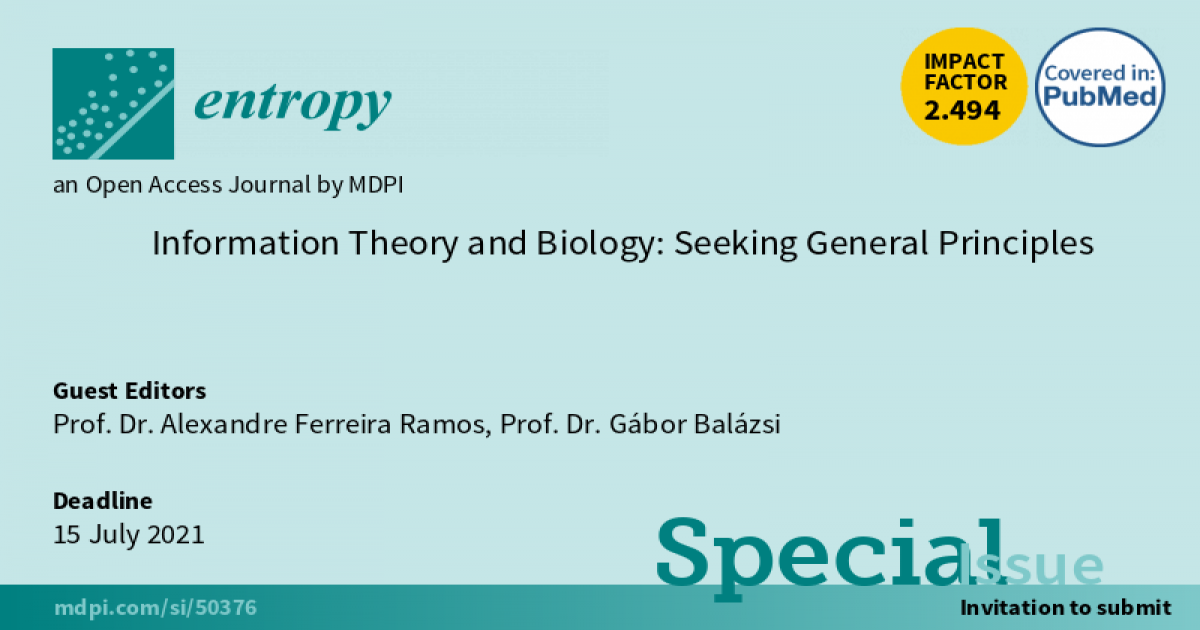- 2.0Impact Factor
- 5.2CiteScore
- 22 daysTime to First Decision
Information Theory and Biology: Seeking General Principles
This special issue belongs to the section “Entropy and Biology“.
Special Issue Information
Dear colleagues,
The massive amount of quantitative data acquired using recently developed experimental techniques for investigating molecular, cellular, tissue, organismic and population level processes, sets the field of quantitative biology for fruitful theoretical elaborations on biological phenomena. These phenomena are characterized by a plethora of interactions resulting in distinguishable dynamical behaviors, with experiments being necessary but not sufficient for revealing the subtleties of their mechanisms. Hence, the theoretical machinery developed in the context of physics, mathematics, statistics, engineering, and computer science can be the basis for providing new insights into the function and organization of living systems. Such interdisciplinary methods are key for understanding how the interaction among several biological components gives rise to dynamical networks capable of operating reliably despite unavoidable random fluctuations. The development of an organism is a striking example of how these networks cope with randomness and generate precise spatio-temporal patterns while adaptation during evolution exemplifies noise exploitation by living systems to deal with ever changing environments. These two examples, and the occurrence of diseases such as cancer characterized by still functional but increased randomness, indicate that biological systems have robust mechanisms to deal with noise and to generate reliable dynamical behaviors. Furthermore, they help to understand how noise effects are either canalized or amplified through the multiple hierarchical levels of biological organization. Information Theory provides a highly suitable toolset for investigating how fluctuating components of a system can generate a reliable behavior in the context of information transmission while helping with biological interpretation. In this call for a Special Issue, we invite the community to submit original research or review articles on the use of information theoretical methods for investigating, discovering, or synthesizing general principles that increase our understanding of biological phenomena. The presentation of experimental results for which subsequent analysis can motivate the development of the field of information theory and the dialogue among disciplines is also encouraged. Information theoretical approaches to Covid-19 related questions will also be considered.
Dr. Alexandre Ferreira Ramos
Prof. Gábor Balázsi
Guest Editors
Manuscript Submission Information
Manuscripts should be submitted online at www.mdpi.com by registering and logging in to this website. Once you are registered, click here to go to the submission form. Manuscripts can be submitted until the deadline. All submissions that pass pre-check are peer-reviewed. Accepted papers will be published continuously in the journal (as soon as accepted) and will be listed together on the special issue website. Research articles, review articles as well as short communications are invited. For planned papers, a title and short abstract (about 250 words) can be sent to the Editorial Office for assessment.
Submitted manuscripts should not have been published previously, nor be under consideration for publication elsewhere (except conference proceedings papers). All manuscripts are thoroughly refereed through a single-blind peer-review process. A guide for authors and other relevant information for submission of manuscripts is available on the Instructions for Authors page. Entropy is an international peer-reviewed open access monthly journal published by MDPI.
Please visit the Instructions for Authors page before submitting a manuscript. The Article Processing Charge (APC) for publication in this open access journal is 2600 CHF (Swiss Francs). Submitted papers should be well formatted and use good English. Authors may use MDPI's English editing service prior to publication or during author revisions.
Keywords
- Information theory
- Entropy
- Stochastic processes
- Robustness, heterogeneity and adaptation in biological processes
- Developmental biology
- Carcinogenesis
- Evolution
- Gene networks
- Signaling pathways
- Biological networks

Benefits of Publishing in a Special Issue
- Ease of navigation: Grouping papers by topic helps scholars navigate broad scope journals more efficiently.
- Greater discoverability: Special Issues support the reach and impact of scientific research. Articles in Special Issues are more discoverable and cited more frequently.
- Expansion of research network: Special Issues facilitate connections among authors, fostering scientific collaborations.
- External promotion: Articles in Special Issues are often promoted through the journal's social media, increasing their visibility.
- Reprint: MDPI Books provides the opportunity to republish successful Special Issues in book format, both online and in print.


